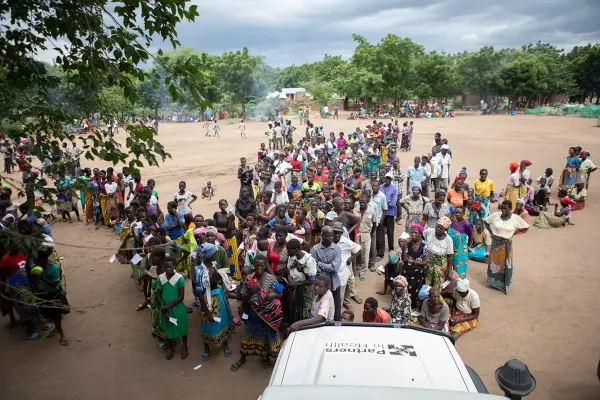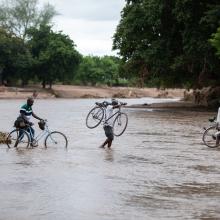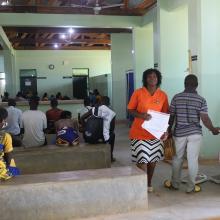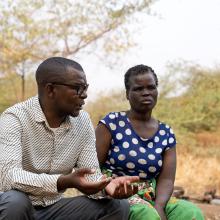The team in Abwenzi Pa Za Umoyo (APZU), as PIH is known in Malawi, is deep into an emergency response after Cyclone Freddy devastated parts of the country, leaving death, injury, and displacement in its wake.
According to Dr. Chiyembekezo Kachimanga, chief medical officer at APZU, the response team has, for the past two weeks, been providing a range of medical and trauma services for individuals and families staying at camps established for people displaced by the storm. The support services include acute medical care for the injured and ill, HIV and chronic disease care and treatment, mental health assistance, screening and treatment for victims of gender-based violence, water, sanitation and hygiene supplies, and maternal and child health care.
“We have reached out to 22 camps, all in Chikwawa,” Kachimanga said.
Psychosocial support is greatly needed, and the two mental health providers on the APZU team have been screening people at the camps for acute stress disorder and providing emergency psychological first aid, Kachimanga added.
Overall, the team is providing emergency support in the Neno, Chikwawa, and Nsanje districts, and targeting 4,500 households with food packages, household materials, and plastic sheets. The team has also procured medicines, supplies, and fuel to aid in the response, as well as 20 oxygen cylinders refilled from Neno plants to be used for the management of critically ill patients in Chikwawa.
“To date, APZU has supported with 22 medical outreach visits providing integrated medical care to 2,210 people,” Kachimanga said.
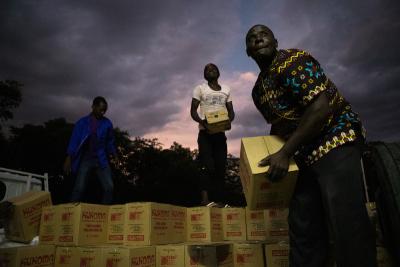
PIH prepares food packages for 1,500 families living in emergency camps in southern Malawi following Cyclone Freddy.
Zack DeClerk
To enhance emergency service provision, APZU also hired and trained 17 health care workers, including nine nurses, five clinicians and three assistant environmental health workers who will be posted at Makhuwira health center, Chikwawa district hospital, and Ngabu community hospital for the next month, officials said.
Cyclone Freddy hit Southern Malawi on March 13, after making landfall in Mozambique. The storm was reported as the longest-lasting tropical cyclone ever recorded in the southern hemisphere, leaving more than 670 people dead in Malawi, with 2,171 injured and over 655,000 displaced into 747 camps, according to a March 30 report from the country’s Department of Disaster Management Affairs. More than 530 people are missing, the report states, and 2.3 million people lost crops.
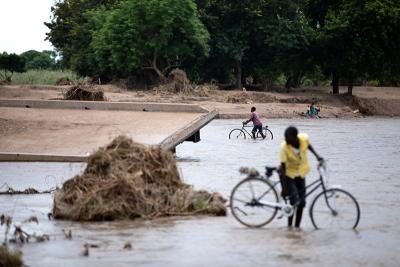
Residents near Somo, Chikwawa navigate around a bridge that collapsed into the Namikalango River during Cyclone Freddy, killing three at the time of collapse. Many residents also lost their crops which were grown along the banks of the river.
Madock Masina
It remains unclear what the longer-term health impacts may be, said Dr. Shada Rouhani, PIH’s director of emergency care. “Disease outbreaks are a risk in humanitarian situations,” she said. “Overcrowding in camps leads to the spread of disease, so there’s a high risk of other outbreaks, such as measles or polio, due to these conditions.”
APZU, based in Neno District in southern Malawi, was asked by the national Ministry of Health to support the emergency effort.
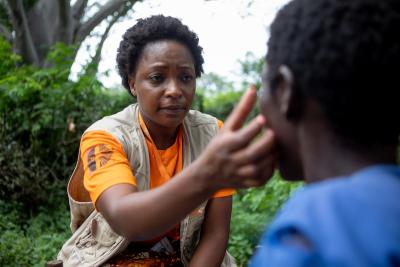
PIH staff member Rachael Mwanza provides medical services at Somo in Chikwawa District. PIH has been providing direct clinical support at three camps, and supplies and pharmacy support for other NGOs at additional camps around southern Malawi.
Madock Masina
As of early April, the team has assisted in the following ways:
- Total number of camps reached: 22
- Total number of people who received medical services: 2,210, including 634 men and 1,576 women
- Total number of patients screened for acute stress disorder: 624
- Total number of people who accessed family planning services: 578
- Total number of children seen in the “under 5” clinic: 471
- Total number of vaccinations provided: 682
